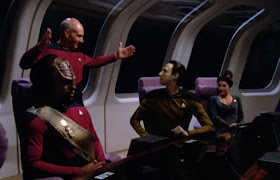Last week I sat down and, while working on a new graphic essay, watched Haven and The Big Goodbye--two episodes at complete opposite ends of the fan appreciation spectrum.
Haven:
So this is the one wherein Troi reveals that Betazoids (this is never brought up again btw) do genetic bonding (read: arranged marriages) all over the place and that her dad for some reason bonded her to one of his buddy's kids. This whole issue has likely been written about all over the place but I'm working and just don't have time to read a bunch of the internet's feelings on the matter. I'm not a fan of this whole idea (and it
really feels like a TOS episode pitch) but that's the way the whole first season is which is something I've already talked about at length. This is an episode both of the generation prior and it's stylistically very much of its own time. The color changing rose, Troi's tight super bun and weird outfit that makes you wonder if she's even in Starfleet (I've also written a whole post about
Troi's uniform) and the object of her arranged affection has floofy late 80s hair and a nice tan and he's a thoughtful doctor who carries around his sketchbook full of pictures he drew of another floofy-haired late 80s person everywhere he goes all the time.
Actually, this guy:
Isn't bad at all. Once you get past the floofy 80s hair and the
Thirty Something styling of this Wyatt Miller dude, he's lending some legit sensitivity to an otherwise fairly ridiculous character. In a seriously silly episode, this actor seems to be playing it straight and he really does stand out. As I was watching I thought, "Wait...this guy looks really familiar. I feel like I've seen him
very recently."
Luckily IMDB exists and I found that he's been on basically every television show since 1999 (including Voyager) but that he was also Clock King in
The Flash which Scott and I finally tried about two weeks ago and then watched it every free second of our time it until we were caught up. This is Wyatt Miller now:
He was also (originally?) in
Arrow but we're going about our bingeing fairly backwards and haven't seen it yet.
Anyway, here's my main takeaway from TNG's Haven: Robert Knepper is a fucking boss and has been ever since he, as Wyatt Miller, got himself out of that arranged marriage and onto a plague ship with the (literal) girl of his dreams.
ONWARDS!
The Big Goodbye:
I've written two posts about this one. The first in
2013 and again when I happened to catch it on TV in
2014. To be fair, I was really not in the mood for
any Trek the January after my whole life had been monopolized by it so it's no wonder that my feelings regarding Picard's first turn as Dixon Hill hadn't changed. And... they still are... well, they're ok.
Look, really, I feel like The Big Goodbye is a good early episode of the show. It heavily features Picard doing interesting things which will pretty much always guarantee at least a couple classic moments. It's a romp. Everyone's running amok in a pulp novel marveling at the slang and the clothes and we're all marveling at them doing it. It's fun.
I think my argument with this one has always been that it gets
too much credit but, as I've mentioned, that's probably more a generational thing than anything else. When this episode first aired I was too young to appreciate it and by the time it came around again I'd seen the show, the writing, the acting develop into something else and I preferred that something else. Still, The Big Goodbye,
is a classic episode so it's worth the watch. And, if you're me, it's worth the watch not because of the trench coats and fedoras, not because of Data's kooky hijinks, not even because of MacFadden's rare chance at some comedy. For me, the reason to spool up this one is to see the usually stuffy Picard fanboy gush over his first experience in the Dixon Hill program to his entire senior staff without any inclination that he's being slightly ridiculous. In this scene, Picard is all of us. In this scene, he's me.




















